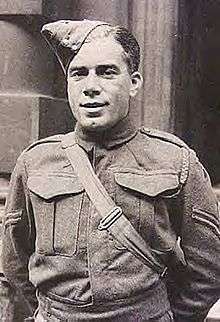James Scully (GC)
| James Patrick Scully | |
|---|---|
 | |
| Born |
20 October 1909 County Dublin |
| Died | 1974 |
| Allegiance |
|
| Service/branch | British Army |
| Rank | Corporal |
| Unit | 256 Company, Pioneer Corps |
| Battles/wars | World War II |
| Awards |
|
Acting Corporal James Patrick Scully (20 October 1909 – 1974) of the Pioneer Corps was awarded the George Cross for the valour he displayed on 8 March 1941 in Liverpool in rescuing people from a bomb damaged building. He was originally from Crumlin, Dublin.[1]
The citation was published in the London Gazette on 8 July 1941, and reads:[2]
| “ | The KING has been graciously pleased to approve the award of the GEORGE CROSS, to:-
No. 13039555 Acting Corporal James Patrick Scully, Pioneer Corps. (Crunslin, (sic) Co. Dublin.) Awarded the George Medal. Lieutenant Charles Cummins Chittenden (163280), Pioneer Corps. When houses were demolished by enemy action, a rescue party under the direction of Lieutenant Chittenden went to the incident and a search was made for trapped people. Corporal Scully located a man and a woman and, with great difficulty, he managed to penetrate the debris and get to where they were buried. Lieutenant Chittenden followed him. Wood was obtained to use as props to shore up the debris, but there was no means of cutting it into proper lengths. A rescue party then arrived with tools to cut some wood into more suitable lengths for shoring. All available help was mustered and the men worked tremendously hard in their efforts to clear away the wreckage. Corporal Scully remained with the trapped persons and prevented any more debris falling on them. A long plank was inserted to take most of the weight but as the result of further falls the props began to sway out of position. There was then a very real danger of the mass of debris falling down and burying the injured persons. Realising this, Corporal Scully placed his back under the plank to try to prevent the props from giving way completely. He steadied them for a time but gradually the weight increased until the props slipped. This left Corporal Scully holding one end of the plank and Lieutenant Chittenden supporting the other. Corporal Scully could have got away at this stage, but he knew that if he did so the debris would fall and probably kill the trapped persons, so he stayed under the plank. Gradually the weight increased and forced Corporal Scully down until he lay across the trapped man. Lieutenant Chittenden who was still holding one end of the plank reached over and supported Corporal Scully's head to prevent him from being suffocated by having his head pressed into the debris. He managed to keep Corporal Scully's face clear, but he was fast becoming exhausted. Despite this, he kept up his spirits and continued to talk encouragingly to the woman. The man was unconscious nearly all this time. Corporal Scully remained in this position throughout the night until, more than seven hours later, the rescue party were able to rescue him and the casualties. When they first entered the house. Lieutenant Chittenden and Corporal Scully knew there was a grave risk of injury or death as the high walls nearby appeared about to collapse at any moment. Had this collapse occurred, they would have been buried under many tons of debris. Corporal Scully risked his life to save the two people and, though the position looked hopeless, Lieutenant Chittenden stayed with him. |
” |
Scully was the only member of the Pioneer Corps to be awarded the George Cross (although 13 George Medals and many other lesser awards have been won by Corps members.).[3] No members of the Pioneer Corps have won the Victoria Cross while serving with the corps, although Francis George Miles served with the corps in World War II after winning the VC while serving with the Gloucestershire Regiment in World War I.
James Scully was the first Catholic recipient of a George Cross and is commemorated by a sculpture at Simpson Barracks. A Troop of the modern-day Royal Logistics Corps is also named after him.
Corporal Scully's medal group including the George Cross was sold at auction in London on 5 July 2011 for £72,000. The auction was held by Dix Noonan Webb and was lot number 705. It was sold with a quantity of original documentation, including the recipient's Soldier's Service and Pay Book; Buckingham Palace Coronation Medal 1953 certificate; membership certificate for the Royal Society of St George; two or three portrait photographs, and the cover feature of The Hornet of January 1967, featuring the recipient's G.C.-winning exploits.
James Scully died in 1974 while visiting his nephew, the English athlete and later sports broadcaster Brendan Foster.[4]
References
- ↑ "James Patrick Scully, GC". George Cross database. Archived from the original on 16 November 2007. Retrieved 22 November 2007.
- ↑ The London Gazette: no. 35213. p. 3919. 8 July 1941. Retrieved 22 November 2007.
- ↑ "The Pioneer – honours and awards". Royal Pioneer Corps Association. Retrieved 22 November 2007.
- ↑ http://www.independent.ie/irish-news/george-cross-awarded-to-irish-hero-of-the-blitz-could-raise-50000-at-auction-26748054.html